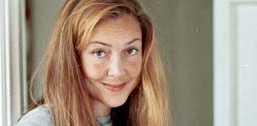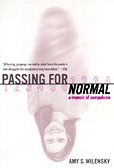|
amy wilenskyAudioLISTEN as Amy reads from her book. Excerpt from Passing for Normal, A Memoir of Compulsion by Amy Wilensky"What are you doing?" I didn't hear the question at first - it was asked of me so frequently I often tuned it out unconsciously - and kept arranging my French fries. "Earth to Amy. Is anybody in there?" Nicole rapped me on the head with characteristic zeal. I was engaged in my customary predinner ritual: If I sorted the fries into pairs before digging in, eliminating an odd man out (if there happened to be one) by placing it on the tray beneath my plate, I could proceed with abandon. Otherwise, I had to count as I ate, which required a steady flow of concentration and made it difficult to participate even superficially in conversation for much of the meal. Over the previous few years, many of my rituals had converged around food; thanks to my father I associated meals with being watched and therefore tense, and I always tried to keep especially still while sitting at a table over food. As always, when I was holding back from twitching, the impulse found an alternate outlet, in this case emerging as an obsession over what and how I ate. Vassar's dining hall was vast and outdated in 1988, when I arrived as a freshman, with the institutional-style dˇcor favored in the 1970s; only the presence of hundreds of students kept it from resembling a hospital cafeteria. Sometimes, when getting through a meal entailed outlasting three waves of fellow diners - as I both pretended and convinced myself I was having such a pleasant time I simply couldn't leave - it became a prison from which I was granted only occasional parole. During my first two years of college, when I lived in the dormitories, I ate two meals a day in the dining hall, often with the same group of people, and became quickly and intimately acquainted with the nuances of the rotating menu. Foods with too many components to count such as cereal and noodles, could be selected only when I was feeling reckless or testing myself. Single-unit foods, such as hamburgers and hotdogs, were the safest bet, as they could be eaten in pairs of bites, totally inconspicuously. The salad bar was safest of all, a reliable fallback in spite of my dislike of most vegetables; it was entirely self-serve, affording total control over numbers and placement, although counting out chickpeas is equally tiresome and time-consuming. It didn't take too long before my new friends began to comment on my odd eating style - how I always chose similar foods, took forever to finish them, and chewed so methodically - but many college students have odd eating styles, and unlike some of the women we knew, at least I ate. I didn't mind so much having my eating habits scrutinized, anyway - it detracted from my other, less explicable bizarre behaviors, made manifest in daily dormitory life, and allowed me to assume my protective mantle of harmless, even engaging eccentricity. Contents Copyright 2001, National Public Radio |
||||||||||



